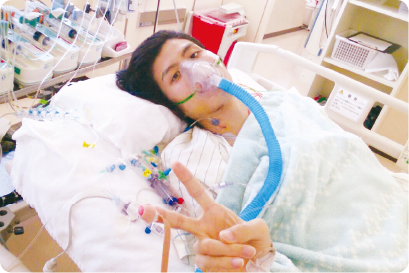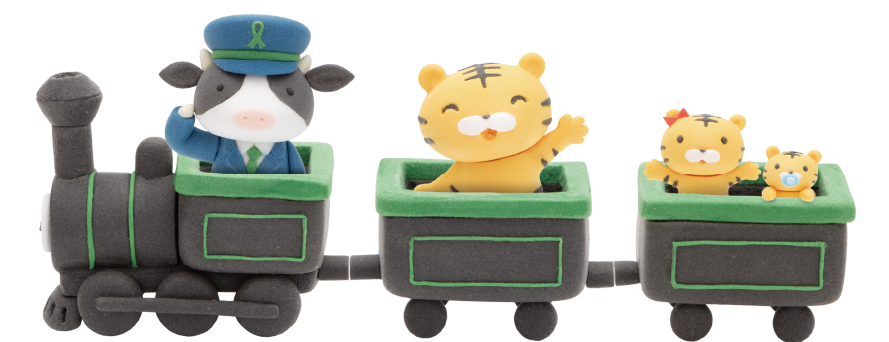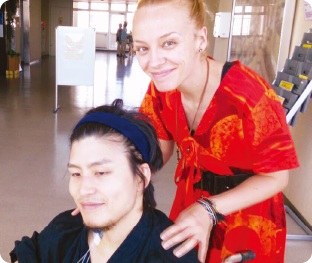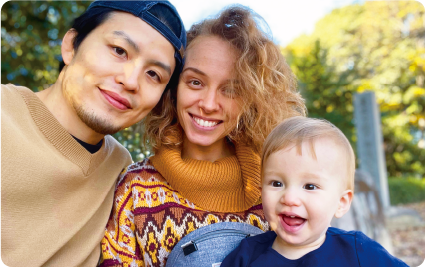think transplant Vol.47
⼼臓移植経験者とそのご家族の⼿記
妻の手記(英語原文)
Heart break. Pain. Adaption. Love and appreciation. These words sum up what has been a roller coaster journey towards transplantation for my husband, myself and his family.
In 2015 our lives changed forever when my husband was suddenly hospitalized and diagnosed with DCM (Dilated Cardiomyopathy). For an accident or illness doesn’t just affect the person concerned, but also impacts those close by-the family, friends and loved ones.
No one thinks about, or has a plan for what to do if someone they love one suddenly becomes ill. In my case my husband’s illness came totally unexpectantly, fast and furious. But I’m thankful to say that this is not a story of tragedy, but rather one of unity, strength and love. “For it is often in our darkest hour that man’s character is made.”
When my husband was diagnosed with heart disease and sent to hospital I never imagined that he wouldn’t come home for years. As a foreigner in Japan, I remember using Google translate to try and understand what the doctors were talking about and why everyone looked so serious? After all, I thought he only had a common cold. Once I saw the English translation of his diagnosis I thought I had mistranslated it. It can’t be right. There’s been a mistake, I thought. But no matter how many times I checked the dictionary and internet for answers, no good news came. Every day I woke up to the nightmare of the reality. It was one of the most depressing times of my life. Due to the dismal outlook for the future I was encouraged to find a new partner. However, after seeing my husband fight for his life with courage and strength, I knew at that moment that he had stolen my heart. How could I leave this man? For we need each other the most when all is lost. His positivity towards his situation was inspiring and I couldn’t help fall in love with him even more. So as the days passed we all adapted to our new life roles. For me, that meant he took priority, so I quit my job to be near him. My mission became to get my husband and myself through one day at a time. The rest of the world could wait.

Having seen people young and old fight for their lives with their families on a daily basis, made me realize that my problems were trivial and things could always be worse. We also began appreciating and looking forward to the small things in life. Such as talking, walking, being able to have lunch together. Finally, being able to go outside and feel the sunshine on our faces, etc. Speaking honestly, if not with a sense of guilt, visiting my husband in hospital and chatting with him all day became my fondest memory. Life as a carer was not simple, though, and can be full of trials and tribulations. It requires sacrifice, patience and a support network. And yet, there is there is no guide book to turn to. No one teaches you how to care for someone. No one teaches you how to balance support whilst encouraging independence. How to give empathy without pity. How do you balance positivity and hope with reality? Who supports the supporters? While doctors diagnose and nurses heal, it can often be the caregivers who help the patient make sense of it all (B.H. Lewis). For it is often during these times of loss or suffering that we look inwards and question why me?

No one’s experience is the same when looking after a loved one who is sick, as illnesses, prognosis, severity and home life/location (etc) all vary. Looking back though, as a foreign national in Japan here are a few small things I contended with:
①Language barrier: I felt useless when I could not understand the doctors or what was happening. I was also nervous that I may have to ask somebody for help/ make an emergency telephone call and not know what to say in time. I was worried about the risk of my husband getting a brain clot and forgetting me and English/ I couldn’t console my Japanese family as I didn’t have the vocabulary.
②Frustration with Japan’s lack of organ donors and strict regulations and restrictions. I wondered why this developed country built on compassion and community is so far behind other countries in terms of organ donations and the principle of charity.
③Mental health care in Japan is limited and lacking.
④Self-blame/ guilt: I felt responsible for his illness. If we hadn’t met would he have still become ill?/ I wished it was me who had gotten ill not him.
⑤Sacrifice: I could not move to England and pursue my own career or be with my own family. Life in Japan is wonderful but there is a lack of job options as a foreigner. I am also always considered an outsider.
⑥Inability to live normally: We couldn’t plan for the future/ I felt like I was constantly watching the clock wondering how long we had left.
⑦Nervous to go out in public with an LVAD/ Feeling responsible for someone’s health or life can be mentally exhausting.

It’s embarrassing to admit that I struggled at times, whilst my husband was facing a much more serious and life-threatening ordeal. However, I now sincerely believe that it’s ok and much healthier to admit when we need help, whether you are a patient, a carer, or a professional. I wouldn’t recommend anyone to suffer in silence. For you cannot look after others until you’ve first looked after yourself. To all those out there feeling lonely, you do not need to fight alone. There’s no shame in asking for help.
Help came unexpecting to us years later from a stranger when my husband received a donor. This donor and family didn’t just save the life of my best friend and husband, but also enabled us to make our own family as I had my first child, a daughter the same year. I’m also excited to say that next year, I will give birth to a son, something which we never thought would be possible years ago. I owe the lives of my family to this donor and I look forward to the day when I can tell my children stories of their daddy’s bravery, journey towards transplantation and all the incredible people we met along the way, loved and lost. I will teach my children to not be ashamed or fear daddy’s scars, as they are not a sign of weakness, but of strength and as a reminder of the suffering he overcame.
While I would not wish ill health onto anyone, my husband’s illness, seeing all people struggle to live and all the health care professionals working endlessly, gave me new eyes from which to view the world. It put real problems into perspective and taught me to appreciate what we have and live well. I concluded that the most precious gift we can give someone is our time. For these lessons I am forever grateful.






